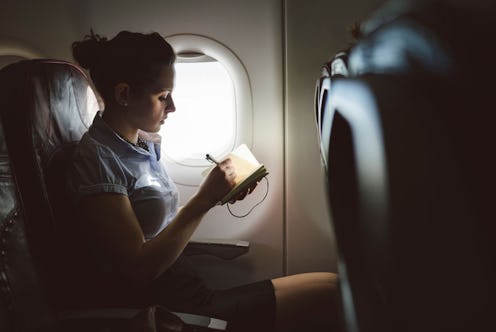Books
7 Easy Ways To Make Sure You Actually Get Writing Done On Your Next Trip

It’s the dream of so many aspiring authors: to pack their bags, hop on a plane, and head off on a globe-trotting adventure, one in which they will finally finish their soon-to-be bestselling novel. But how do you actually successfully write while you travel? It isn’t always easy, but there are plenty of tips and tricks you can follow if you want to maximize your word count while you’re on the go.
Few things go together better than writing and travel. Seeing new places, meeting new people, and trying new things can provide both inspiration and motivation for aspiring novelists, poets, journalists, and writers of all kind. But just because travel can spur great stories doesn’t mean it's always easy to reach your writing goals while you’re on the road. If you want to enjoy your trip and make progress on your writing projects, whatever they may be, you have to be prepared, disciplined, and resolute no matter where your travels take you or who tags along for the ride.
Whether you’re going on a fun-filled vacation with friends and family, a romantic couple’s getaway, or a solo adventure, just you and your laptop, follow these seven tips if you want to write more, and write better, while you travel.
Set clear goals before you leave.
In addition to creating a packing to-do list, make yourself a writing to-do list before you leave for your trip or vacation. Do you want to reach a certain daily word count, complete a specific set of chapters or stories, or finish editing something you've already written? Setting clear goals is an important step in any writing process, but it becomes even more important when you're trying to travel and write at the same time.
Create a schedule, and stick to it.
Many professional writers will tell you that routines make all the difference, and this is is especially true when you are traveling. Whether you schedule one hour of uninterrupted writing time a day, or set aside an entire day every week you are gone, it is important to create a realistic writing schedule for your vacation that you can stick to. Maybe waking up an hour before your family means you can reach your writing goal every day, or perhaps taking lunch alone to jot down new ideas works best for your and your travel companions. Whatever the schedule is, make sure it is one that won't compromise your travel experience or your ability to write.
Pack a notebook and pen.
Whether you're traveling to a popular tourist city or an off-the-grid campsite, the internet and power sources while traveling are never 100 percent reliable. That is why you should at least pack a notebook and pen, in case you need to write analog style for a day or two.
Take advantage of your time in transit.
Waiting at an airport for a delayed flight? Stuck on a long-distance bus ride? Trapped on a train overnight? Use that time to brainstorm, edit, or write. That way, when you get to your destination, you can enjoy your experience without having to worry about choosing between doing a fun activity or hanging back to try and your word count goal.
Set boundaries with your travel companions.
In my experience, one of the biggest challenges of writing while traveling is the people you are with. Of course you want to enjoy time with your friends and family, but by making it clear you plan to work by telling them when, how much, and how often you need to be writing will decrease conflict and your own guilt, and increase the chance you will meet your goals and have fun at the same time.
Keep a travel journal.
Whether you are a travel writer or not, keeping a travel journal can help you practice your craft no matter where you go or what you do. Writing about the places you go, the people you meet, and the things you do will help hone your writing skills, and possibly inspire your next project.
Read, read, and read some more.
Some of the most common advice you will hear authors give to aspiring writers is to read more, and the same rule applies when you are on the road. If you want to write not only more, but write better, you have to make time to read. It really does make all the difference.